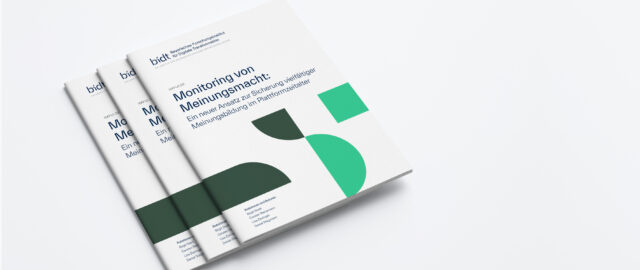All areas of society are undergoing a massive digital transformation, from work to nursing and education. For people to become digitally empowered, they need to develop an understanding of the algorithmic processing of data. “We need a broad, democratic discourse on how we want to live, learn and work with AI,” summarises bidt director Professor Ute Schmid.
To engage in this discourse, everyone – from skilled workers to hairdressers to journalists – needs to have some understanding of the mechanisms underlying AI.
 Prof. Dr. Ute Schmid To the profile
Prof. Dr. Ute Schmid To the profile
Ute Schmid is a Professor of Applied Computer Science at the University of Bamberg. In addition to her research focus, “human-like” machine learning, she has dedicated herself to teaching data literacy. Data literacy and AI skills should play a role in every educational biography in the future, according to the computer scientist. Like reading and writing, data handling should become indispensable to general education. Only people who are able to handle new digital technologies knowledgeably and responsibly can take advantage of the opportunities of digital change without losing sight of the risks. There are still many misconceptions and prejudices about artificial intelligence in our society. “There are those who fear that machines will eventually take over the world,” says Ute Schmid, “and others who see dollar signs and increased efficiency in every Deep Learning application.” Some people fear the wrong things; others are too optimistic. Many of the perceptions of AI are based on completely false ideas about artificial intelligence, which come from science fiction films, for example, or simplified media representations. Despite all the hype, machine learning systems are still far from human intelligence.
Ute Schmid works on so-called partnership-based AI systems, in which humans and machines support each other: Her machine-learning systems benefit from human expertise but keep humans open-eyed, and do not demand blind trust.
I am a firm believer in benevolent AI, which can both relieve and benefit people. We just need to develop it properly and embed it socio-technically.
 Prof. Dr. Ute Schmid To the profile
Prof. Dr. Ute Schmid To the profile
But which methods are suitable for imparting AI knowledge and achieving digital maturity? “That depends strongly on the respective target group,” says Ute Schmid. “I’m interested in the question: How can I present the topic in a way that gives the target audience as much knowledge as possible without scaring them off or overwhelming them?” For primary schools, the computer scientist developed the AI Campus course “Digital Literacy for Primary Schools”, aimed at teachers. She also launched the Digital Starter educational game series, which playfully teaches computational thinking. With the help of illustrative and haptic materials, children learn about a simple neural network, for example. For older children, she and her team members wrote the book “Künstliche Intelligenz selber programmieren” (Programming Artificial Intelligence Yourself), published in the Dummies Junior series. In addition, Ute Schmid lectures at adult education centres and theatres and is available for exchanges with students of various subjects. “I always try to convey as concretely as possible what AI and machine learning are,” Ute Schmid tells us. Many listeners would then lose their fear of contact and develop more understanding of the opportunities and risks of AI. For knowledge transfer to succeed, three things are fundamental: “You have to know your field, have a passion for it and like the dialogue with people.” Only when these three fundamentals are in place can digital literacy be taught effectively and in a way that is appropriate for the target group; the didactic toolbox is almost secondary.
Ute Schmid has been lecturing on artificial intelligence since 2001 and has been involved in teaching data literacy and basic computer skills for almost as long. Even after so many years of sharing knowledge, she still learns something from every encounter with her students.
In every lecture, there are things that I suddenly understand differently – for example, because a student asked a question that I had never asked myself before.
 Prof. Dr. Ute Schmid To the profile
Prof. Dr. Ute Schmid To the profile
This is similar to what happens when talking to the public. “To be asked unexpected questions and to look for ways to explain and communicate is a creative act, “says Ute Schmidt. “I find that incredibly appealing.”





